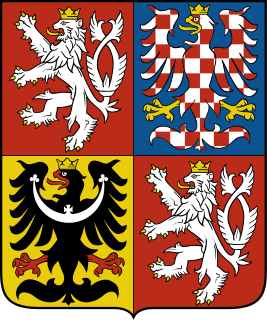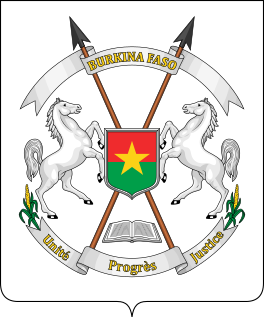
The President of Iceland is Iceland's elected head of state. The incumbent is Guðni Thorlacius Jóhannesson, who is now in his first term as president, elected in 2016.
A constitutional amendment is a modification of the constitution of a polity, organization or other type of entity. Amendments are often interwoven into the relevant sections of an existing constitution, directly altering the text. Conversely, they can be appended to the constitution as supplemental additions (codicils), thus changing the frame of government without altering the existing text of the document.

The Czech Republic elects a legislature at a national level. The Parliament has two chambers. The Chamber of Deputies has 200 members, elected for a four-year term by proportional representation with a 5% election threshold for political parties. The Senate has 81 members in single-seat constituencies, elected by two-round runoff voting for a six-year term, with one third of seats contested every even year in the autumn. The President of the Czech Republic was indirectly elected for five-year terms until 2012; beginning with the 2013 election, the president is elected by direct two-round runoff voting.

Elections in Syria gives information on election and election results in Syria.

A constitutional referendum was held in Burundi on 9 March 1992. It followed the 1991 referendum on the Charter of National Unity, which gave the government a mandate to draw up a new constitution. The resulting document created a presidential republic with unlimited five-year term for candidates, introduced proportional representation as the method for electing the Parliament, guaranteed freedom of the press and human rights, and the requirement for registered political parties to accept the Charter of National Unity.

A constitutional referendum was held in the Democratic Republic of Congo on 18 and 19 December 2005. Voters were asked whether they approved of a proposed new constitution. It was approved by 84% of voters, with the first elections held under the new constitution in 2006.

A referendum on the direct election of the President was held in France on 28 October 1962. The question was whether to have the President of the French Republic elected by direct popular vote, rather than by an electoral college. It was approved by 62.3% of voters with a 77.0% turnout. However, the reform was controversial because it strengthened the executive at the expense of Parliament, and because of the disputed constitutionality of the procedure used.

The Republic of Niger has had seven constitutions, two substantial constitutional revisions, and two periods of rule by decree since its independence from French colonial rule in 1960. The current "Seventh Republic" operates under the Constitution of 2010.

The current Constitution of Madagascar was, according to the national electoral commission, endorsed by a majority of voters in the constitutional referendum held on 14 November 2010. The new constitution launched the Fourth Republic of Madagascar and was widely seen as an attempt to consolidate and legitimise the rule of Andry Rajoelina and his High Transitional Authority government which was installed after a military-backed coup d'état against President Marc Ravalomanana at the beginning of the ongoing national political crisis. One substantive change from the constitution of the Third Republic was to lower the minimum age for presidential candidates from 40 to 35. This made Rajoelina, aged 36 at the time, eligible to stand in presidential elections.

The 2005 Egyptian constitutional referendum took place in Egypt on 25 May 2005. The referendum was on a proposed change to the constitution of Egypt which would establish direct elections for the presidency. The opposition parties called for a boycott of the vote, which was passed by a large majority.

A constitutional referendum was held in the Republic of the Congo on 20 January 2002, with results showed over 87% voted in favour with a voter turnout of 77.5%.

The Constitution of Ivory Coast was approved by referendum on October 30, 2016 and officially adopted on November 8, 2016.

A constitutional referendum was held in the Republic of the Congo on 15 March 1992. The new constitution created a presidential republic with a bicameral parliament and a division of powers between the two. It was approved by 96% of voters with a 70.9% turnout.

A constitutional referendum was held in the Central African Republic on 1 February 1981, following the overthrow of Jean-Bédel Bokassa in 1979. The new constitution would make the country a presidential republic with a unicameral National Assembly, as well as restoring multi-party democracy for the first time since 1962. It was approved by 98.55% of voters with a 92.53% turnout.

A constitutional referendum was held in the Central African Republic on 28 December 1994. The new constitution would make the country a presidential republic with a unicameral National Assembly and a Prime Minister accountable to both the President and the National Assembly. It was approved by 82.7% of voters with a 45% turnout.

A constitutional referendum was held in the Central African Republic on 5 December 2004. The new constitution would change the system of government from presidential to semi-presidential, as well as putting a limit of two terms on the President. It was approved by 91.37% of voters with a 77.1% turnout.

A referendum on electing a Constitutional Assembly was held in Colombia on 27 May 1990 alongside presidential elections. The proposal was approved by 96% of voters. A Constitutional Assembly was later elected in December 1990 and produced the 1991 constitution.

The 1997 Constitution of Uruguay refers to the 1967 Constitution with amendments.

A constitutional referendum will be held in Burkina Faso on 24 March 2019. If approved, the new constitution will end the Fourth Republic created in 1991.

















